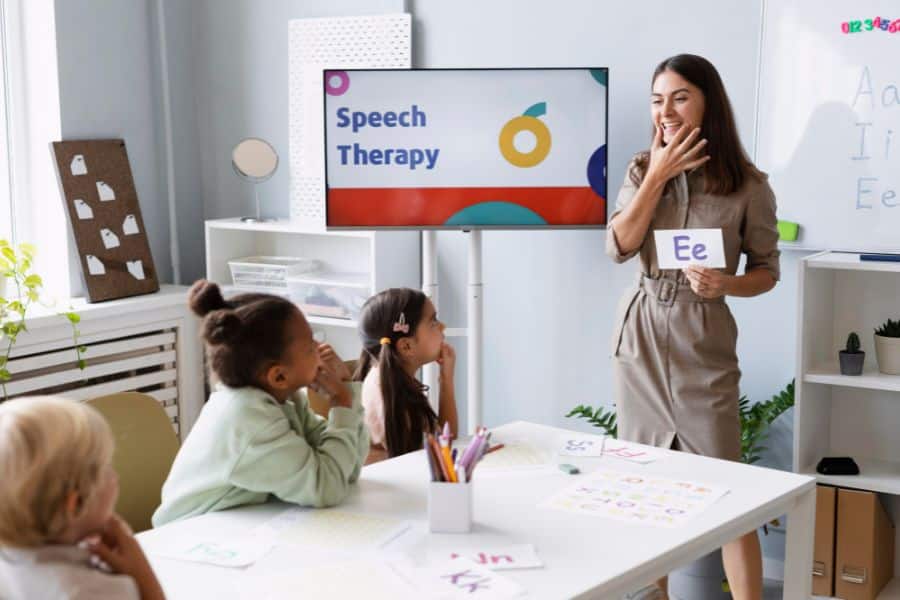Ultimate Guide to Delayed Speech Treatment and Early Intervention
Delayed speech in children is a common concern among parents and caregivers. It refers to when a child’s speech development is slower than expected for their age. Early detection and intervention are crucial to ensuring a child develops strong communication skills. In this article, we will discuss the signs of delayed speech, when to seek professional help, causes, diagnosis, treatment options, and the benefits of early intervention.
What is Delayed Speech?
Delayed speech refers to a condition where a child has a slower-than-expected speech development compared to their peers. While it is normal for children to develop at different rates, certain speech milestones are expected at specific ages. Delayed speech can impact a child’s ability to communicate effectively, which may lead to frustration and behavioural issues. The good news is that with early intervention, many children can catch up and develop normal speech patterns.
Signs of Delayed Speech
Recognizing delayed speech early can help parents seek professional help before the problem worsens. Below are some common signs that may indicate a delay in speech development:
Limited or No Babbling by 12 Months: By 12 months, most babies begin to babble, making sounds like “ba-ba” or “da-da.” A lack of babbling may be an early sign of delayed speech.
Failure to Say Single Words by 16 Months: By 16 months, many children can say their first simple words, such as “mama” or “ball.” If your child has not started speaking by this age, it may indicate a delay.
Difficulty Combining Two Words by Age 2: Around the age of 2, children begin to combine two words, such as “want cookie” or “big truck.” If your child is not forming simple sentences by this age, it could be a sign of delayed speech.
Struggles with Following Simple Instructions: By age 2 to 3, children should be able to follow simple instructions like “come here” or “give me the toy.” Difficulty following instructions can point to speech or language delays.
Poor Pronunciation or Inability to Form Sentences by Age 3: By age 3, children should be able to pronounce most words clearly and form simple sentences. If your child is still unable to speak clearly or form sentences, professional evaluation is recommended.
Minimal or No Interest in Social Interaction or Communication: Delayed speech may also be linked to a lack of interest in social interaction. If your child seems uninterested in communicating with others, this could be a sign.
Regression or Loss of Previously Acquired Speech Milestones: In some cases, a child may lose words or skills they previously mastered. This regression in speech is a serious sign that warrants professional help.
Causes of Delayed Speech
Several factors can contribute to delayed speech. Identifying the cause is critical to providing appropriate treatment. Some common causes of delayed speech include:
Developmental Delays: Some children experience speech and language delays as part of a broader developmental delay. These delays can be addressed with speech therapy and other interventions.
Hearing Impairments: Hearing problems, such as ear infections or hearing loss, can impact a child’s ability to learn and develop speech. Hearing tests are essential to rule out hearing impairments as a cause of delayed speech.
Neurological Conditions: Conditions like autism, cerebral palsy, and other neurological disorders can affect speech development. In such cases, specialized treatment is required to address both the speech and the underlying condition.
Environmental Factors: A lack of interaction, stimulation, or exposure to language can result in delayed speech. Children who do not have regular communication opportunities or who grow up in environments with limited verbal interaction may experience speech delays.
Genetic Factors: Sometimes, delayed speech can run in families due to genetic factors. If a family member has experienced similar delays, it may increase the likelihood of a child having delayed speech.
How Delayed Speech is Diagnosed?
To diagnose delayed speech, a healthcare professional will typically perform a comprehensive evaluation. This may include:
Initial Consultation with a Pediatrician or Speech Therapist: The first step is often to consult with a pediatrician or speech-language pathologist. They will assess the child’s speech development and determine whether there is cause for concern.
Developmental Milestone Assessment: The healthcare provider will review the child’s developmental milestones and compare them with the typical age-appropriate milestones for speech and language.
Hearing Tests: Since hearing problems can contribute to delayed speech, a hearing test may be recommended to rule out hearing loss.
Neurological Evaluations: If a neurological condition is suspected, further evaluations, including brain imaging or developmental screenings, may be conducted.
Parental Observation and Reporting: Parents and caregivers will provide valuable information about the child’s communication behaviours, which can help identify potential delays.
Treatment Options for Delayed Speech
There are several treatment options available for children with delayed speech. The appropriate treatment will depend on the cause and severity of the delay. Some of the most effective treatment options include:
Speech Therapy
Speech therapy is the most common treatment for delayed speech. A speech-language pathologist (SLP) works with the child to improve their language and communication skills. Techniques used in speech therapy may include:
- Articulation Exercises: These exercises help children learn to pronounce sounds correctly.
- Language Development Activities: Activities designed to build vocabulary and sentence structure.
- Social Interaction Techniques: Speech therapists may encourage play-based communication to help children learn conversational skills.
The frequency and duration of speech therapy sessions will depend on the individual needs of the child.
Occupational Therapy
In cases where sensory or motor issues are affecting speech, occupational therapy may be recommended. Occupational therapists work with children to improve fine motor skills and sensory processing, which can help with speech development.
Medical and Technological Interventions
If hearing loss is identified as the cause of delayed speech, hearing aids or cochlear implants may be used to improve hearing and, in turn, speech development. Medications may also be prescribed if there is an underlying medical condition.
Parent and Caregiver Involvement
Parents and caregivers play a vital role in supporting speech development at home. Techniques like reading to the child, speaking slowly, and engaging in conversations can encourage language development. Consistent interaction with the child is key to reinforcing the progress made in therapy.
Educational Support
In some cases, children may benefit from attending specialized programs or schools that focus on speech and language development. Collaboration between therapists and educators can help provide a well-rounded support system for the child.
Benefits of Early Intervention
Early intervention for delayed speech is crucial for a child’s long-term success. Some of the benefits of addressing speech delays early include:
Improved Communication Skills: Children who receive early treatment can improve their speech and language skills, leading to better communication.
Enhanced Social Interactions: As speech improves, children are better able to engage in social interactions, which can help with forming relationships and building emotional intelligence.
Better Academic Performance: Communication is key to academic success. Early intervention helps children develop the skills they need to succeed in school.
Reduced Frustration and Behavioural Issues: Delayed speech can cause frustration in children, which can lead to behavioural issues. Early treatment can minimize these challenges.
When to Seek Professional Help
If your child shows any of the signs of delayed speech mentioned above, it is essential to seek professional help. The earlier the intervention, the better the chances for improvement. You should consider consulting a professional if:
Speech Milestones Are Not Met: If your child does not meet key speech milestones, such as babbling by 12 months or saying their first words by 16 months, it’s time to seek advice from a pediatrician or speech therapist.
Difficulty Understanding or Expressing Needs: If your child has difficulty expressing themselves or understanding simple instructions, it may indicate a need for speech evaluation.
Frustration or Behavioural Issues: If your child becomes frustrated due to their inability to communicate, it may lead to behavioural problems. Delayed speech can often cause emotional distress, and professional intervention can help alleviate this.
Family History of Speech Disorders: If there is a history of speech or language disorders in the family, your child may be more likely to experience delayed speech. In such cases, seeking early help can prevent further issues.
Concerns from Caregivers, Teachers, or Pediatricians: If a teacher, caregiver, or pediatrician expresses concern about your child’s speech development, it’s important to take these concerns seriously and seek professional help.
Final Assessment
Delayed speech is a common concern, but with early detection and appropriate treatment, many children can overcome this challenge. Recognizing the signs of delayed speech and seeking professional help is crucial to providing the best outcomes. Treatment options like speech therapy, occupational therapy, and medical interventions can help children develop strong communication skills, leading to improved social interactions and academic success. By remaining proactive and supportive, parents can ensure their child receives the care they need to thrive.
If you suspect your child is experiencing delayed speech, don’t hesitate to seek professional guidance. Serene Wellness offers a comprehensive approach to address speech and developmental delays through their expert child counselling services, homeopathic remedies, and holistic treatments. Their skilled team of professionals is dedicated to ensuring your child’s optimal well-being and helping them regain their confidence and speech abilities. Early intervention can make a significant difference, so reach out to Serene Wellness today for personalized care tailored to your child’s needs.
Image Reference : Freepik
Disclaimer: All trademarks, logos, and brand names are the property of their respective owners. All company, product, and service names used in this website are for identification purposes only. Use of these names, trademarks, and brands does not imply endorsement.






